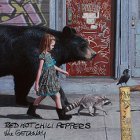Review | Red Hot Chili Peppers run out of road on The Getaway
Red Hot Chili Peppers![The Getaway -Headstuff.org]()
The Getaway
[Universal]
For a band that experienced such frequent line-up changes in the early half of its career, it’s rather strange to be able to say that Red Hot Chili Peppers are in uncharted territory. Firstly, while they’ve managed to make it through the five years since 10th studio offering I’m With You without a disruption to the lineup, the departure of Rick Rubin from production duties after six albums has seen him end a working relationship with the band extending over 20 years.
Perhaps more intriguingly, though, is the opportunity for Josh Klinghoffer to really break out of John Frusciante’s shadow with his sophomore effort. With Frusciante’s first Chilis record, 1989’s Mother’s Milk, it felt as if he was somewhat trapped and restrained by the legacy of Hillel Slovak, his own predecessor. Mother’s Milk was a loud, brash yet nevertheless endearing record, but it wasn’t until Frusciante could step out of Slovak’s shadow that he began to thrive and let his own personality shine through in 1991’s Blood Sugar Sex Magick.
You can almost hear Klinghoffer go through the same struggles, the same uncertainty that Frusciante did on 2011’s commendable but ultimately overly safe I’m With You. In essence, The Getaway had the potential to be the guitarist’s Blood Sugar, his magnum opus, his statement of intent. Disappointingly, it doesn’t work out like that at all.
I should qualify that by saying that that’s not entirely Klinghoffer’s fault – there are definitely embers of a smoldering identity visible in patches here, but The Getaway is so exasperatingly lifeless for the vast majority of its 53 minutes – and downright terrible in others – that it feels like a massive backwards step.
To its credit, the record opens with some semblance of confidence. The title track, while minimalist in scope, actually flows really nicely between what can loosely be considered verses and choruses. Klinghoffer reaffirms the impression that he is a much more textural guitarist than Frusciante, content to blend into the harmony, his simple laid back melodies enhancing and complementing Kiedis’s own.
[youtube id=”Q0oIoR9mLwc”]
However, he’s curiously restrained in the next two numbers. Underwhelming lead single ‘Dark Necessities’, anchored by jaded and overly familiar sounding slap bass, and the Californication-lite ‘We Turn Red’ fail to really kick The Getaway into any kind of tempo. Both also suffer from some fairly pedestrian vocal melodies. This is something which Kiedis has gotten away with in the past, but in the presence of such passive accompaniment, he feels uncomfortably exposed.
And it’s when the instrumentation feels threadbare that The Getaway continues to fall down. ‘Goodbye Angels’ is built on the foundation of some frustratingly basic and arrhytmic guitar plucking, eventually reinforced in its second half with some light slap bass work, but it’s not enough to colour the song. ‘Go Robot’ is decent funk rock on the surface, but Klinghoffer opting to keep his playing textural rather than coming further forward in the mix to complement Flea’s work makes it suffer, particularly in the face of some more lethargic vocal takes.
Then again, it’s tracks like ‘Detroit’ and ‘This Ticonderoga’ that make you think that all of this misguided subtlety may be for the best. The two heaviest tracks on the album are the most insultingly derivative and downright abrasive, the guitar and bass riffs so lazily basic and the vocals so grating that it’s a wonder how they were in the reckoning at all for inclusion here.
Mercifully, though, it’s not all bad. There are some genuinely fantastic moments on the album, the respective choruses of ‘The Longest Wave’ and ‘The Hunter’ being the most memorable. ‘The Longest Wave’ doesn’t start off too brightly, but the chorus ignites when Klinghoffer really lets himself go. Even though the line he plays is relatively simple, it both soars above and compliments Kiedis’s own melodies perfectly, even joining him in unison in the final phrase for a surprisingly satisfying resolution. It’s more of the same on ‘The Hunter’, with Kiedis’s admirably ambitious but ultimately floundering vocals in the verse transforming as the music swells in the chorus, Klinghoffer effortlessly weaving his own melody among those of his frontman.
Yet that’s the frustration with The Getaway. It feels defined by moments, rather than any one standout piece of music.
Even allowing for the fact that the natural course for an aging band to take is to try to replace energy with nuance, The Getaway feels more than consciously restrained. It feels uncharacteristically shy, unsure of itself. The instrumentation doesn’t feel stripped back by design, but more by uncertainty. It’s not just Klinghoffer failing to grasp the opportunity to really begin his legacy that causes significant issues here – Flea and Chad Smith seem content this time around to work as more of a passive rhythm section, but because of that, there’s nothing to fill the void. Whereas the mix and the songwriting on 2006’s Stadium Arcadium had the guitar far too prominent, The Getaway feels like it has gone to the other extreme, and none of Klinghoffer’s band mates have stepped up to occupy that musical space, leaving the whole effort feel hollow and undeveloped.
I’m With You hinted at a bright future for the Chili Peppers beyond the John Frusciante era, but The Getaway makes you believe that they’ll never quite find themselves again.
FIVE / TEN
For more RHCP action, check out the latest episode of the NO ENCORE podcast


